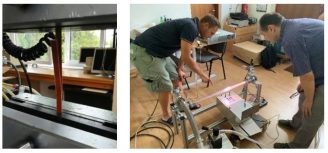Researchers from the Jožef Stefan Institute participated in the development of ecologically benign technology for joining polymeric products
Simtrona d. o. o. is a micro company, specialized in the development and manufacturing of RFID (Radio Frequency Identification) tags for wood marking. These tags are gradually replacing barcodes as standard identifiers as global demand for them is constantly increasing. The company has developed RFID nails, known as Smart Nails, used for marking trees, wood and other wooden products. With marking each wooden object or product obtains unique code for control of wood flow and preventing misuse in the wood economy.
The main challenge to overcome in the production process of Smart Nail was the use of environment hazardous technology for treatment of polymeric components before they were glued together. Therefore, the company started cooperation with researchers from the Department of Surface Engineering at the Jožef Stefan Institute (Slovenia) and International Iberian Nanotechnology Laboratory (Portugal). Before the mentioned step, brushing and activation with hazardous chemicals had to be done first. According to the guidelines of the material manufacturer every type of material had to be glued or printed with special glue, or alternatively, with printable dye. During the research project it was discovered, that wide array of glues can be used for most of materials, in case that materials are first adequately treated with the gaseous plasma.
It was this part where extensive experience and knowledge of the researchers from the Department for Surface Engineering at the Jožef Stefan Institute coincided with the technology challenge of the company, since their research activities cover plasma technologies, plasma characterization and treatment of materials with plasma, including the research of surfaces, interfaces and thin films as well. Beside many scientific achievements in the previous years, the Department successfully completed several research projects with the companies.
Results
The cooperation enabled the company to upgrade its manufacturing process and with it to produce Smart Nails in the highest quality range. The product has now more than 40 years of warranty. Additionally, the new manufacturing technology is ecologically benign, because the hazardous chemicals are no longer used in the manufacturing process or with the treatment of the Smart Nail surface. This also lowered the costs and consequently increased accessibility of the Smart Nails.
The company is very satisfied with the research project results, since tree marking allows in initial phases optimal monitoring of tree growth and other parameters. The quality of the product is excellent, since all tests indicate a very strong and durable joint between Smart Nail components. This provides high-level protection of chip, antenna and other components against impacts from the environment.
Key success factors
The key success factors were knowledge and experience of both technology centers. Small companies like Simtrona d. o. o. are restricted with investments in services of world-class researchers due to unstable market conditions and uncertainty of positive return on the investment. In the scope of research cooperation with researcher from Slovenia and Portugal, the company achieved a breakthrough innovation and with it new available possibilities in the future. In the development of the solution played important role extensive experience of scientists from the the Department for Surface Engineering on the field of plasma and its applications.
The innovative technology for Smart Nails manufacturing allows according to the tests at the technology center four times longer warranty period than before. This is counted as key achievements on the field of wood and timber, since Smart Nails are constantly exposed to harsh conditions in the environment.
The company Simtrona d. o. o. was in all phases of the development process supported by experts at the Center for Technology Transfer and Innovation at the Jožef Stefan Institute: with partner search, establishing contact and communication between all parties involved to support with documentation and other activities.

Overview of production process (left) and testing of plasma treated samples (right)
Cooperation took place under the frame of the project KET4CleanProduction, where additional presentation of this succes story is available.
The research project was formed and financed with the support of the Center for Technology Transfer and Innovation at the Jožef Stefan Institute.

